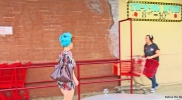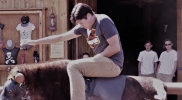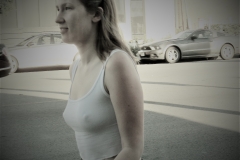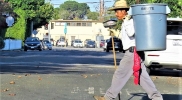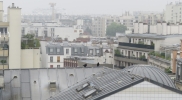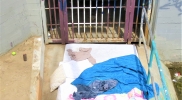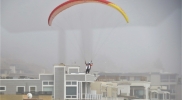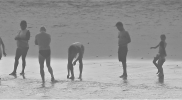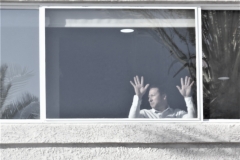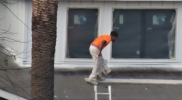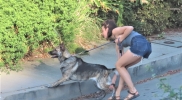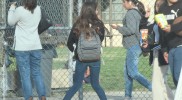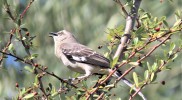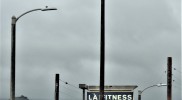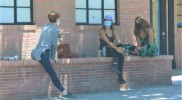|
|
Best Poems - Poets & Poetry
Best Poems – POETS & POETRY
|
| |
| Preludes For Memnon, LVI – Conrad Aiken
“Rimbaud and Verlaine, precious pair of poets,
Genius in both (but what is genius?) playing
Chess on a marble table at an inn
With chestnut blossom falling in blond beer
And on their hair and between knight and bishop—
Sunlight squared between them on the chess-board
Cirrus in heaven, and a squeal of music
Blown from the leathern door of Ste. Sulpice—
Discussing, between moves, iamb and spondee,
Anacoluthon and the open vowel
God the great peacock with his angel peacocks
And his dependent peacocks, the bright stars:
Disputing too of fate as Plato loved it,
Or Sophocles, who hated and admired,
Or Socrates, who loved and was amused:
Verlaine puts down his pawn upon a leaf
And closes his long eyes, which are dishonest,
And says ‘Rimbaud, there is one thing to do:
We must take rhetoric and wring its neck! . . .’
Rimbaud considers gravely, moves his Queen;
And then removes himself to Timbuctoo.
And Verlaine dead,—with all his jades and mauves;
And Rimbaud dead in Marseilles with a vision,
His leg cut off, as once before his heart;
And all reported by a later lackey,
Whose virtue is his tardiness in time.
Let us describe the evening as it is:—
The stars disposed in heaven as they are:
Verlaine and Shakespeare rotting, where they rot,
Rimbaud remembered, and too soon forgot;
Order in all things, logic in the dark;
Arrangement in the atom and the spark;
Time in the heart and sequence in the brain—
Such as destroyed Rimbaud and fooled Verlaine.
And let us take godhead by the neck—
And strangle it, and with it, rhetoric.” |
| |
| Sonnet 42 – Julia Alvarez (from “33”)
“Sometimes the words are so close I am
more who I am when I’m down on paper
than anywhere else as if my life were
practicing for the real me I become
unbuttoned from the anecdotal and
unnecessary and undressed down
to the figure of the poem, lie by line,
the real text a child could understand.
Why do I get confused living it through?
Those of you, lost and yearning to be free,
who hear thee words, take heart from me.
I once was in as many drafts as you.
But briefly, essentially, here I am. . .
Who touches this poem touches a woman.
|
| |
On The Circuit – W. H. Auden
"Among Pelagian travelers,
Lost on their lewd conceited way
To Massachusetts, Michigan,
Miami or L.A.,
An airborne instrument I sit,
Predestined nightly to fulfill
Columbia-Giesen-Management’s
Unfathomable will,
By whose election justified,
I bring my gospel of the Muse
To fundamentalists, to nuns,
To Gentiles and to Jews,
And daily, seven days a week,
Before a local sense has jelled,
From talking-site to talking-site
Am jet-or-prop-propelled.
Though warm my welcome everywhere
I shift so frequently, so fast,
I cannot now say where I was
The evening before last,
Unless some singular event
Should intervene to save the place,
A truly asinine remark,
A soul-bewitching face,
Or blessed encounter, full of joy,
Unscheduled on the Giesen Plan,
With, here, an addict of Tolkien,
There, a Charles Williams fan.
Since Merit but a dunghill is,
I mount the rostrum unafraid:
Indeed, ‘twere damnable to ask
If I am overpaid.
Spirit is willing to repeat
Without a qualm the same old talk,
But Flesh is homesick for our snug
Apartment in New York.
A sulky fifty-six, he finds
A change of mealtime utter hell,
Grown far too crotchety to like
A luxury hotel.
The Bible is a goodly book
I always can peruse with zest,
But really cannot say the same
For Hilton’s Be My Guest.
Nor bear with equanimity
The radio in students’ cars,
Muzak at breakfast, or—dear God!—
Girl-organists in bars.
Then, worst of all the anxious thought,
Each time my plane begins to sink
And the No Smoking sign comes on:
What will there be to drink?
Is this a milieu where I must
How grahamgreeneish! How infra dig!
Snatch from the bottle in my bag
An analeptic swig?
Another morning comes: I see,
Dwindling below me on the plane,
The roofs of one more audience
I shall not see again.
God bless the lot of them, although
I don’t remember which was which:
God bless the U.S.A., so large,
So friendly, and so rich."
|
| An Apology – F. J. Bergmann
“Forgive me
for backing over
and smashing
your red wheelbarrow.
It was raining
and the rear wiper
does not work on
my new plum-colored SUV.
I am also sorry
about the white
chickens.” |
| |
| Solidarity Is the Name We Give To What We Cannot Hold – Charles Bernstein
I am a nude formalist poet, a sprung
syntax poet, a multitrack poet, a
wondering poet, a social expressionist
poet, a Baroque poet, a constructivist poet,
an ideolectical poet. I am a New York poet in
California, a San Francisco poet on
the Lower East Side, an Objectivist poet
in Royaumont, a surrealist poet in Jersey,
a Dada poet in Harvard Square,
a zaum poet in Brooklyn, a merz poet
in Iowa, a cubo-futurist poet in Central Park.
I am a Buffalo poet in Providence, a London
poet in Cambridge, a Kootenay School
of Writing poet in Montreal, a local poet
in Honolulu.
I am a leftist poet in my armchair
and an existential poet on the street;
an insider poet among my friends,
an outsider poet in midtown.
I am a serial poet, a paratactic poet, a
disjunctive poet, a discombobulating poet,
montage poet, a collage poet, a hypertextual
poet, a nonlinear poet, an abstract poet,
a nonrepresentational poet, a process poet,
a polydiscourse poet, a conceptual poet.
I am a vernacular poet, a talk poet, a dialect
poet, a heteroglossic poet, a slang poet, a
demotic poet, a punning poet, a comic poet.
I am an iambic poet I am,
a dactylic poet, a tetrameter poet,
an anapestic poet.
I am a capitalist poet in Leningrad
and a socialist poet in St. Petersburg;
a bourgeois poet at Zabar’s, a union poet
in Albany; an elitist poet on TV,
a political poet on the radio.
I am a fraudulent poet, an incomprehensible poet, a degenerate
poet, an incompetent poet, an indecorous poet, a crude poet
an incoherent poet, a flat-footed poet, a disruptive poet, a
fragmenting poet, a contradictory poet, a self-imploding poet,
a conspiratorial poet, an ungainly poet, an anti-dogmatic poet,
an infantile poet, a theoretical poet, an awkward poet, a sissy
poet, an egghead poet, a perverse poet, a clumsy poet,
a cacophonous poet, a vulgar poet, a warped
poet, a silly poet, a queer poet, an
erratic poet, an erroneous poet, an anarchic poet,
a cerebral poet, an unruly poet,
an emotional poet, a (no) nonsense poet. I am a language
poet wherever people try to limit the modes of
expression or nonexpression. I am an experimental poet
to those who value craft over interrogation, an
avant-garde poet to those who see the future
in the present. I am a Jewish poet hiding in the shadow
of my great-grandfather and great-grandmother.
I am a difficult poet in Kent, a visual poet in
Cleveland, a sound poet in Cincinnati.
I am a modernist poet to postmodernists and a postmodern poet
to modernists. I am a book artist in Minneapolis
and a language artist in Del Mar.
I am a lyric poet in Spokane, an analytic
poet in South Bend, a narrative poet
in Yellow Knife, a realist
poet in Berkeley.
I am an antiabsorptive poet in the morning,
an aborptive poet in the afternoon,
and a sleepy poet at night.
I am a parent poet, a white poet, a man poet, an urban poet, an
angered poet, a sad poet,
an elegiac poet, a raucous poet, a frivolous poet, a detached
poet, a roller-coaster poet, a
volcanic poet, a dark poet, a skeptical poet, an eccentric poet, a
misguided poet, a reflective
poet, a dialectical poet, a polyphonic poet, a hybrid poet, a
wandering poet, an odd poet, a
lost poet, a disobedient poet, a bald poet, a virtual poet.
& I am none of these things,
nothing but the blank wall of my aversions
writ large in disappearing ink— |
| |
| comments upon my last book of poesy – Charles Bukowski
“you’re better than ever.
you’ve sold out.
you suck.
my mother hates you.
you’re rich.
you’re the best writer in the English language.
can I come see you?
I write just like you do, only better.
why do you drive a BMW?
why don’t you give more readings?
can you still get it up?
do you know Allen Ginsberg?
what do you think of Henry Miller?
will you write a foreword to my next book?
I enclose a photograph of Céline.
I enclose my grandfather’s pocket watch.
the enclosed jacket was knitted by my wife in Bavarian style.
have you been drunk with Mickey Rourke?
I am a young girl 19 years old and I will come and clean your
house.
you are a stinking bastard to tell people that Shakespeare is not
readable.
what do you think of Norman Mailer?
why do you put down Hemingway?
why do you steal from Hemingway?
why do you knock Tolstoy?
I’m doing hard time and when I get out I’m coming to see you
you’ve saved my god-damned life.
why do you hate women?
I love you.
I read your poems at parties.
did all those things really happen to you?
why do you drink?
I saw you at the racetrack but I didn’t bother you.
I’d like to renew our relationship.
do you really stay up all night?
I can out-drink you.
you stole it from Sherwood Anderson.
did you ever meet Ezra?
I am alone and I think of you every night.
who the hell do you think you’re fooling?
my tits aren’t much but I’ve got great legs.
fuck you, man.
my wife hates you.
will you please read the enclosed poems and comment?
I am going to publish all those letters you wrote me.
you jack-off motherfuck, you’re not fooling anybody.” |
| |
A New Poet – William Canton
“I write. He sits beside my chair,
And scribbles, too, in hushed delight,
He dips his pen in charmèd air:
What is it he pretends to write?
He toils and toils; the paper gives
No clue to aught he thinks. What then?
His little heart is glad; he lives
The poems that he cannot pen.
Strange fancies throng that baby brain,
What grave, sweet looks! What earnest eyes!
He stops—reflects—and now again
His unrecording pen he plies.
It seems a satire on myself—
These dreamy nothings scrawled in air,
This thought, this work! Oh, tricksy elf,
Wouldst drive the father to despair?
Despair! Ah, no; the heart, the mind
Persists in hoping–schemes and strives
That there may linger with our kind
Some memory of our little lives.
Beneath his rock in the early world
Smiling the naked hunter lay,
And sketched on horn the spear he hurled
The urus which he made his prey.
Like him I strive in hope my rhymes
May keep my name a little while—
O child, who knows how many times
We two have made the angels smile!” |
| |
| Advice to Writers – Billy Collins
“Even if it keeps you up all night,
wash down the walls and scrub the floor
of your study before composing a syllable.
Clean the place as if the Pope were on his way.
Spotlessness is the niece of inspiration.
The more you clean, the more brilliant
your writing will be, so do not hesitate to take
to the open fields to scour the undersides
of rocks or swab in the dark forest
upper branches, nests full of eggs.
When you find your way back home
and stow the sponges and brushes under the sink,
you will behold in the light of dawn
the immaculate altar of your desk,
a clean surface in the middle of a clean world.
From a small vase, sparkling blue, lift
a yellow pencil, the sharpest of the bouquet,
and cover pages with tiny sentences
like long rows of devoted ants
that followed you in from the woods.” |
| |
| The Suggestion Box – Billy Collins
“It all began fairly early in the day
at the coffee shop as it turned out
when the usual waitress said
I’ll bet you’re going to write a poem about this
after she had knocked a cup of coffee into my lap.
Then later in the morning I was told
by a student that I should write a poem
about the fire drill that was going on
as we all stood on the lawn outside our building.
In the afternoon a woman I barely knew
said you could write a poem about that,
pointing to a dirigible that was passing overhead.
And if all that were not enough,
a friend turned to me as we walked past
a man whose face was covered with tattoos
and said, I see poem coming!
Why is everyone being so helpful?
I wondered that evening by the shore of a lake.
Maybe I should write a poem
about all the people who think
they know what I should be writing poems about.
It was just then in the fading light that I spotted
a pair of ducks emerging
from a cluster of reeds to paddle out to open water,
the female glancing back over her russet shoulder
just in time to see me searching my pockets for a pen.
I knew it, she quacked, with a bit of a brogue.
But who can blame you for following your heart?
she went on.
Now, go write a lovely poem about me and the mister.”
|
| |
| The Trouble With Poetry – Billy Collins
“The Trouble with poetry, I realized
as I walked along a beach one night—
cold Florida sand under my bare feet,
a show of stars in the sky—
the trouble with poetry is
that it encourages the writing of more poetry,
more guppies crowding the fish tank,
more baby rabbits
hopping out of their mothers into the dewy grass.
And how will it ever end?
unless the day finally arrives
when we have compared everything in the world
to everything else in the world,
and there is nothing left to do
but quietly close our notebooks
and sit with our hands folded on our desks.
Start of newsletter promotion.
Poetry fills me with joy
and I rise like a feather in the wind.
Poetry fills me with sorrow
and I sink like a chain flung from a bridge.
But mostly poetry fills me
with the urge to write poetry,
to sit in the dark and wait for a little flame
to appear at the tip of my pencil.
And along with that, the longing to steal,
to break into the poems of others
with a flashlight and a ski mask.
And what an unmerry band of thieves we are,
cut-purses, common shoplifters,
I thought to myself
as a cold wave swirled around my feet
and the lighthouse moved its megaphone over the sea,
which is an image I stole directly
from Lawrence Ferlinghetti—
to be perfectly honest for a moment—
the bicycling poet of San Francisco
whose little amusement park of a book
I carried in a side pocket of my uniform
up and down the treacherous halls of high school.”
|
| |
| Tuesday, June 4th, 1991 – Billy Collins
“By the time I get myself out of bed, my wife has left
the house to take her botany final and the painter
has arrived in his van and is already painting
the columns of the front porch white and the decking gray.
It is early June, a breezy and sun-riddled Tuesday
that would quickly be forgotten were it not for my
writing these few things down as I sit here empty-headed
at the typewriter with a cup of coffee, light and sweet.
I feel like the secretary to the morning whose only
responsibility is to take down its bright, airy dictation
until it’s time to got to lunch with the other girls,
all of us ordering the cottage cheese with half a pear.
This is what stenographers do in courtrooms,
alert at their dark contraptions catching every word.
When there is a silence they sit still as I do,
waiting and listening, fingers resting lightly on the keys.
This is what Samuel Pepys did too, jotting down in
private ciphers minor events that would have otherwise
slipped into the heavy, amnesiac waters of the Thames.
His vigilance paid off finally when London caught fire
as mine does when the painter comes in for coffee.
and says how much he likes this slow, vocal rendition
of ‘You don’t Know What Love is’ and I figure I will
make him a tape when he goes back to his brushes and pails.
Under the music I can hear the rush of cars and trucks
on the highway and every so often the new kitten, Felix,
hops into my lap and watches my fingers drumming out
a running record of this particular June Tuesday
as it unrolls before my eyes, a long intricate carpet
that I am walking on slowly with my head bowed
knowing that it is leading me to the quiet shrine
of the afternoon and the melancho9ly candles of evening.
If I look up, I see out the window the white stars
of clematis climbing a ladder of strings, a woodpile,
a stack of faded bricks, a small green garden of herbs,
things you would expect to find outside a window,
all written down now and placed in the setting
of a stanza as unalterably as they are seated
in their chairs in the ontological rooms of the world.
Yes, this is the kind of job I could succeed in,
an unpaid but contented amanuensis whose hands
are two birds fluttering on the lettered keys,
whose eyes see sunlight splashing through the leaves,
and the bright pink asterisks of honeysuckle
and the piano at the other end of this room with
its small vase of faded flowers and its empty bench.
So convinced am I that I have found my vocation,
tomorrow I will begin my chronicling earlier,
at dawn, a time when hangmen and farmers are up and doing
when men holding pistols stand in a field back to back.
It is the time the ancients imagined in rows, as Eos
or Aurora, who would leave her sleeping husband in bed,
not to take her botany final, but to pull the sun,
her brother, over the horizon’s brilliant rim,
her four-horse chariot aimed at the zenith of the sky.
But tomorrow, dawn will come the way I picture her,
barefoot and disheveled, standing outside my window
in one of the fragile cotton dresses of the poor.
She will look in at me with her thin arms extended,
offering a handful of birdsong and a small cup of light.” |
| |
The Ballad Of Prose And Rhyme – Austin Dobson
“When the ways are heavy with mire and rut,
In November fogs, in December snows,
When the North Wind howls, and the doors are shut,—
There is place and enough for the pains of prose;
But whenever a scent from the whitethorn blows,
And the jasmine-stars at the casement climb,
And a Rosalind-face at the lattice shows,
Then hey!– for the ripple of laughing rhyme!
When the brain gets dry as an empty nut,
When the reason stands on its squarest toes,
When the mind (like a beard) has a ‘formal cut,’—
There is place and enough for the pains of prose;
But whenever the May-blood stirs and glows,
And the young year draws to the ‘golden prime,’
And Sir Romeo sticks in his ear a rose,—
Then hey!– for the ripple of laughing rhyme…” |
| |
Poet – Ralph Waldo Emerson
“To clothe the fiery thought
In simple words succeeds,
For still the craft of genius is
To mask a king in weeds.” |
| |
Constantly Risking Absurdity (#15) – Lawrence Ferlinghetti
“Constantly risking absurdity
and death
whenever he performs
above the heads
of his audience
the poet like an acrobat
climbs on rime
to a high wire of his own making
and balancing on eyebeams
above a sea of faces
paces his way
to the other side of day
performing entrechats
and sleight-of-foot tricks
and other high theatrics
and all without mistaking
any thing
for what it may not be
For he’s the super realist
who must perforce perceive
taut truth
before the taking of each stance or step
in his supposed advance
toward that still higher perch
where Beauty stands and waits
with gravity
to start her death-defying leap
And he
a little charleychaplin man
who may or may not catch
her fair eternal form
spreadeagled in the empty air
|
| |
Populist Manifesto – Lawrence Ferlinghetti
“Poets, come out of your closets,
Open your windows, open your doors,
You have been holed-up too long
in your closed worlds.
Come down, come down
from your Russian Hills and Telegraph Hills,
your Beacon Hills and your Chapel Hills,
your Mount Analogues and Montparnasses,
down from your foothills and mountains,
out of your teepees and domes.
The trees are still falling
and we’ll to the woods no more.
No time now for sitting in them
As man burns down his own house
to roast his pig.
No more chanting Hare Krishna
while Rome burns.
San Francisco’s burning,
Mayakovsky’s Moscow’s burning
the fossil-fuels of life.
Night & the Horse approaches
eating light, heat & power,
and the clouds have trousers.
No time now for the artist to hide
above, beyond, behind the scenes,
indifferent, paring his fingernails,
refining himself out of existence.
No time now for our little literary games,
no time now for our paranoias & hypochondrias,
no time now for fear & loathing,
time now only for light & love.
We have seen the best minds of our generation
destroyed by boredom at poetry readings.
Poetry isn’t a secret society,
It isn’t a temple either.
Secret words & chants won’t do any longer.
The hour of oming is over,
the time of keening come,
the time for keening & rejoicing
over the coming end
of industrial civilization
which is bad for earth & Man.
Time now to face outward
in the full lotus position
with eyes wide open,
Time now to open your mouths
with a new open speech,
time now to communicate with all sentient beings,
All you ‘Poets of the Cities’
hung in museums including myself,
All you poet’s poets writing poetry
about poetry,
All you poetry workshop poets
in the boondock heart of America,
All you housebroken Ezra Pounds,
All you far-out freaked-out cut-up poets,
All you pre-stressed Concrete poets,
All you cunnilingual poets,
All you pay-toilet poets groaning with graffiti,
All you A-train swingers who never swing on birches,
All you masters of the sawmill haiku
in the Siberias of America,
All you eyeless unrealists,
All you self-occulting supersurrealists,
All you bedroom visionaries
and closet agitpropagators,
All you Groucho Marxist poets
and leisure-class Comrades
who lie around all day
and talk about the workingclass proletariat,
All you Catholic anarchists of poetry,
All you Black Mountaineers of poetry,
All you Boston Brahmins and Bolinas bucolics,
All you den mothers of poetry,
All you zen brothers of poetry,
All you suicide lovers of poetry,
All you hairy professors of poesie,
All you poetry reviewers
drinking the blood of the poet,
All you Poetry Police—
Where are Whitman’s wild children,
where the great voices speaking out
with a sense of sweetness and sublimity,
where the great’new vision,
the great world-view,
the high prophetic song
of the immense earth
and all that sings in it
And our relations to it—
Poets, descend
to the street of the world once more
And open your minds & eyes
with the old visual delight,
Clear your throat and speak up,
Poetry is dead, long live poetry
with terrible eyes and buffalo strength.
Don’t wait for the Revolution
or it’ll happen without you,
Stop mumbling and speak out
with a new wide-open poetry
with a new commonsensual ‘public surface’
with other subjective levels
or other subversive levels,
a tuning fork in the inner ear
to strike below the surface.
Of your own sweet Self still sing
yet utter ‘the word en-masse’—
Poetry the common carrier
for the transportation of the public
to higher places
than other wheels can carry it.
Poetry still falls from the skies
into our streets still open.
They haven’t put up the barricades, yet,
the streets still alive with faces,
lovely men & women still walking there,
still lovely creatures everywhere,
in the eyes of all the secret of all
still buried there,
Whitman’s wild children still sleeping there,
Awake and walk in the open air.”
|
| |
| Poetry Should Ride The Bus – Ruth Forman
“poetry should hopscotch in a polka dot dress
wheel cartwheels
n hold your hand
when you walk past the yellow crackhouse
poetry should wear bright red lipstick
n practice kisses in the mirror
for all the fine young men with fades
shootin craps around the corner
poetry should dress in fine plum linen suits
n not be so educated that it don’t stop in
every now n then to sit on the porch
and talk about the comins and goins of the world
poetry should ride the bus
in a fat woman’s Safeway bag
between the greens n chicken wings
to be served with tuesday’s dinner
poetry should drop by a sweet potato pie
ask about the grandchildren
n sit through a whole photo album
on an orange plastic covered lazyboy with no place to go
poetry should sing red revolution love songs
that massage your scalp
and bring hope to your blood
when you think you’re too old to fight
yeah
poetry should whisper electric blue magic
all the years of your life
never forgettin to look you in the soul
every once in a while
n smile” |
| January 1940 – Roy Fuller
“Swift had pains in his head.
Johnson dying in bed
Tapped the dropsy himself.
Blake saw a flea and an elf.
Tennyson could hear the shriek
Of a bat. Pope was a freak.
Emily Dickinson stayed
Indoors for a decade.
Water inflated the belly
Of Hart Crane and of Shelley.
Coleridge was a dope.
Southwell died on a rope.
Byron had a round white foot.
Smart and Cowper were put
Away. Lawrence was a fidget.
Keats was almost a midget.
Donne, alive in his shroud,
Shakespeare in the coil of a cloud,
Saw death very well as he
Came crab-wise, dark and massy.
I envy not only their talents
And fertile lack of balance
But the appearance of choice
In their sad and fatal voice.” |
| |
|
A Supermarket in California – Allen Ginsberg
“What thoughts I have of you tonight, Walt Whitman, for I walked down the sidestreets under the trees with a headache self-conscious looking at the full moon.
In my hungry fatigue, and shopping for images, I went into the neon fruit supermarket, dreaming of your enumerations!
What peaches and what penumbras! Whole families shopping at night! Aisles full of husbands! Wives in the avocados, babies in the tomatoes!—and you, Garcia Lorca, what were you doing down by the watermelons?…”
|
Bicycles – Nikki Giovanni
“Midnight poems are bicycles
Taking us on safer journeys
Than jets
Quicker journeys
Than walking
But never as beautiful
A journey
As my back
Touching you under the quilt
Midnight poems
Sing a sweet song
Saying everything
Is all right
Everything
Is
Here for us
I reach out
To catch the laughter
The dog thinks
I need a kiss
Bicycles move
With the flow
Of the earth
Like a cloud
So quiet
In the October sky
Like licking ice cream
From a cone
Like knowing you
Will always
Be there
All day long I wait
For the sunset
The first star
The moon rise
I move
To a midnight
Poem
Called
You
Propping
Against
The dangers”
|
| |
|
In This Place – Amanda Gorman
(An original poem written for the inaugural reading of Poet Laureate Tracy K. Smith at the Library of Congress)
There’s a poem in this place—
in the footfalls in the halls
in the quiet beat of the seats.
It is here, at the curtain of day,
where America writes a lyric
you must whisper to say.
There’s a poem in this place—
in the heavy grace,
the lined face of this noble building,
collections burned and reborn twice.
There’s a poem in Boston’s Copley Square
where protest chants
tear through the air
like sheets of rain,
where love of the many
swallows hatred of the few.
There’s a poem in Charlottesville
where tiki torches string a ring of flame
tight round the wrist of night
where men so white they gleam blue—
seem like statues
where men heap that long wax burning
ever higher
where Heather Heyer
blooms forever in a meadow of resistance.
There’s a poem in the great sleeping giant
of Lake Michigan, defiantly raising
its big blue head to Milwaukee and Chicago—
a poem begun long ago, blazed into frozen soil,
strutting upward and aglow.
There’s a poem in Florida, in East Texas
where streets swell into a nexus
of rivers, cows afloat like mottled buoys in the brown,
where courage is now so common
that 23-year-old Jesus Contreras rescues people from floodwaters.
There’s a poem in Los Angeles
yawning wide as the Pacific tide
where a single mother swelters
in a windowless classroom, teaching
black and brown students in Watts
to spell out their thoughts
so her daughter might write
this poem for you.
There’s a lyric in California
where thousands of students march for blocks,
undocumented and unafraid;
where my friend Rosa finds the power to blossom
in deadlock, her spirit the bedrock of her community.
She knows hope is like a stubborn
ship gripping a dock,
a truth: that you can’t stop a dreamer
or knock down a dream.
How could this not be her city
su nación
our country
our America,
our American lyric to write—
a poem by the people, the poor,
the Protestant, the Muslim, the Jew,
the native, the immigrant,
the black, the brown, the blind, the brave,
the undocumented and undeterred,
the woman, the man, the nonbinary,
the white, the trans,
the ally to all of the above
and more?
Tyrants fear the poet.
Now that we know it
we can’t blow it.
We owe it
to show it
not slow it
although it
hurts to sew it
when the world
skirts below it.
Hope—
we must bestow it
like a wick in the poet
so it can grow, lit,
bringing with it
stories to rewrite—
the story of a Texas city depleted but not defeated
a history written that need not be repeated
a nation composed but not yet completed.
There’s a poem in this place—
a poem in America
a poet in every American
who rewrites this nation, who tells
a story worthy of being told on this minnow of an earth
to breathe hope into a palimpsest of time—
a poet in every American
who sees that our poem penned
doesn’t mean our poem’s end.
There’s a place where this poem dwells—
it is here, it is now, in the yellow song of dawn’s bell
where we write an American lyric
we are just beginning to tell.
|
| |
Impression – Edmund Gosse
“In these restrained and careful times
Our knowledge petrifies our rhymes;
Ah! for that reckless fire men had
When it was witty to be mad;
When wild conceits were piled in scores,
And lit by flaming metaphors,
When all was crazed and out of tune—
Yet throbbed with music of the moon.
If we could dare to write as ill
As some whose voices haunt us still,
Even we, perchance, might call our own
Their deep enchanting undertone.
We are too diffident and nice,
Too learnèd and too over-wise,
Too much afraid of faults to be
The flutes of bold sincerity.
For, as this sweet life passes by,
We blink and nod with critic eye;
We’ve no words rude enough to give
Its charm so frank and fugitive.
The green and scarlet of the park,
The undulating streets at dark,
The brown smoke blown across the blue,
This colored city we walk through;
The pallid faces full of pain
The field-smell of the passing wain,
The laughter, longing, perfume, strife,
The daily spectacle of life;
Ah! how shall this be given to rhyme,
By rhymesters of a knowing time?
Ah! for the age when verse was glad,
Being godlike, to be bad and mad.”
|
| |
Poetical Economy – Harry Graham
“What hours I spent of precious time,
What pints of ink I used to waste,
Attempting to secure a rhyme
To suit the public taste,
Until I found a simple plan
Which makes the lamest lyric scan!
When I’ve a syllable de trop,
I cut it off, without apol.:
This verbal sacrifice, I know,
May irritate the schol.;
But all must praise my dev’lish cunn.
Who realize that Time is Mon.
My sense remains as clear as cryst.,
My style as pure as any Duch.
Who does not boast a bar sinist.
Upon her fam. escutch.;
And I can treat with scornful pit.
The sneers of ev’ry captious crit.
I gladly publish to the pop.
A scheme of which I make no myst.,
And beg my fellow scribes to cop.
This labor-saving syst.
I offer it to the consid.
Of ev’ry thoughtful individ.
The author, working like a beav.,
His readers’ pleasure could redoub.
Did he but now and then abbrev.
The work he gives his pub.
(This view I most partic. suggest
To A. C. Bens. and G. K. Chest.)
If Mr. Caine rewrote The Scape.,
And Miss Corell, condensed Barabb.,
What could they save in foolscap pape.
Did they but cult. the hab.,
Which teaches people to suppress
All syllables that are unnec.!
If playwrights would but thus dimin.:
The length of time each drama takes,
(The Second Mrs. Tanq. by Pin.
or even Ham., by Shakes.)
We could maintain a watchful att.
When at a Mat. on Wed. or Sat.
Have done, ye bards, with dull monot.!
Foll. my examp., 0, Stephen Phill.,
O, Owen Seam., O, William Wat.,
O, Ella Wheeler Wil.,
And share with me the grave respons.
of writing this amazing nons!”
|
| |
Celebrity Stalking – Sonia Greenfield
“The celebrities are at it again. They keep
stalking me for poetry. Just the other day
George Clooney tried to deliver my pizza
so I could sign his broadside, Meryl Streep
crouched in my back yard with a first edition
in hand, Julia Roberts broke into my bathroom
to ask about pentameter, and Charlie Sheen left
twenty-six voicemails asking for sexstinas
written in the colloquial language of porn,
but these movie stars think they know the real me
behind the poetry because they read tabloids
in line at the super market that detail
the lurid private lives of poets who take lovers,
get caught without make-up, carry small dogs,
enjoy gay trysts, drink absinthe, and own
many-chambered homes with deep-pile
cream carpets, secret rooms, and libraries
the size of Luxembourg. They couldn’t know
that I’m allergic to even numbers and no longer
fluent in filthy words. I’m feeling inflamed
on this spring nocturnal in the City of Angels,
a hundred watt moon on the rise and the song birds
playing their music well past prime time
like neighbors with no children. No moment,
no poet ever safe from the paparazzi
so we duck into seedy bars while tourists
mug with our tread-upon stars inlaid
along Hollywood Boulevard.”
|
| |
Genius – Nikki Grimes
“‘Sis! Wake up!’ I whisper
in the middle of the night.
Urgently, I shake her
till she switches on the light.
The spiral notebook in my hand
provides her quick relief.
It tells her there’s no danger
of a break-in by a thief.
‘Okay,’ she says, then, props herself
up vertically in bed.
She nods for me to read my work.
I cough, then forge ahead.
The last verse of my poem leaves
her silent as a mouse.
I worry till she says, ‘We have
a genius in the house.'”
|
| |
| English Class – Nikki Grimes
“I was smart
and a smart-ass.
Truth be told,
you couldn’t tell me much.
foul-mouthed kids
warned me
not to think I was ‘all that’
just because
I said ask instead of axe
and got great grades
in English.
I didn’t much care
what they thought,
as long as I got to write
book reports
and compositions
and any other homework
that let me
lose myself in words.
Somehow, I knew writing
could take me places.
Even my teacher
told me so.
Still, there was no
getting around
one unfortunate fact:
writing was
a lonely business.” |
Poem 169: Shakespearean Sonnet – R S Gwynn
"A man is haunted by his father’s ghost.
A boy and girl love while their families fight.
A Scottish king is murdered by his host.
Two couples get lost on a summer night.
A hunchback murders all who block his way.
A ruler’s rivals plot against his life.
A fat man and a prince make rebels pay.
A noble Moor has doubts about his wife.
An English king decides to conquer France.
A duke learns that his best friend is a she.
A forest sets the scene for this romance.
An old man and his daughters disagree.
A Roman leader makes a big mistake.
A sexy queen is bitten by a snake."
|
| |
The Argument Of His Book – Robert Herrick
“I sing of Brooks, of Blossoms, Birds, and Bowers,
Of April, May, of June, and July-Flowers.
I sing of May-poles, Hock-carts, Wassails, Wakes,
Of Bride-grooms, Brides, and of their Bridal-cakes.
I write of Youth, of Love, and have access
By these, to sing of cleanly-wantonness.
I sing of Dews, of Rains, and piece by piece
Of Balm, of Oil, of Spice, and Ambergris.
I sing of Time’s trans-shifting; and I write
How Roses first came red, and Lilies white.
I write of Groves, of Twilights, and I sing
The Court of Mab, and of the Fairie-King.
I write of Hell. I sing (and ever shall)
Of Heaven, and hope to have it after all.”
|
| |
|
The Height of Ridiculous – Oliver Wendell Holmes
“I wrote some lines once on a time
In wondrous merry mood,
And thought, as usual, men would say
They were exceedingly good.
They were so queer, so very queer,
I laughed as I would die;
Albeit, in the general way,
A sober man am I.
I called my servant, and he came;
How kind it was of him
To mind a slender man like me,
He of the mighty limb!
‘These to the printer,’ I exclaimed,
And, in my humorous way,
I added, (as a trifling jest,)
‘There’ll be the devil to pay.’
He took the paper, and I watched,
And saw him peep within;
At the first line he read, his face
Was all upon the grin.
He read the next; the grin grew broad,
And shot from ear to ear;
He read the third; a chuckling noise
I now began to hear.
The fourth; he broke into a roar:
The fifth; his waistband split;
The sixth; he burst five buttons off,
And tumbled in a fit.
Ten days and nights, with sleepless eye,
I watched that wretched man,
And since, I never dare to write
As funny as I can.”
|
| |
| A Library Of One – J. H. Leigh Hunt
“Were I to name, out of the times gone by,
The poets dearest to me, I should say,
Pulci for spirits, and a fine, free way;
Chaucer for manners, and close, silent eye;
Milton for classic taste, and harp strung high;
Spenser for luxury, and sweet, sylvan play;
Horace for chatting with, from day to day;
Shakespeare for all, but most, society.
But which take with me, could I take but one?
Shakespeare,—as long as I was unoppressed
With the world’s weight, making sad thoughts intenser;
But did I wish, out of the common sun
To lay a wounded heart in leafy rest,
And dream of things far off and healing,—Spencer.” |
| Rochelle – Reuben Jackson
“i want to have
an affair
with your
poems.
take the haiku you read
on a late night
plane to chicago,
sip bourbon
with that villanelle
in a penthouse
on central park
west.
or considering
your love for this city,
an apartment above
washington
harbor.
sky dimming
like a chandelier
at twilight,
slow kisses
for each word.” |
| Plea For Forgiveness – Rodney Jones
“The old man William Carlos Williams, who had been famous for kindness
And for bringing to our poetry a mannerless speaking,
In the aftermath of a stroke was possessed by guilt
And began to construct for his wife the chronicle
Of his peccadilloes, an unforgivable thing, a mistake
Like all pleas for forgiveness, but he persisted
Blindly, obstinately, each day, as though in the end
It would relieve her to know the particulars
Of affairs she must have guessed and tacitly permitted
For she encouraged his Sunday drives across the river.
His poems suggest as much; anyone can see it.
The thread, the binding of the voice, is a single hair
Spliced from the different hairs of different lovers,
And it clings to his poems, blond and dark,
Tangled and straight, and runs on beyond the page.
I carry it with me, saying, ‘I have found it so.’
It is a world of human blossoming, after all.
But the old woman, sitting there like rust—
For her, there would be no more poems of stolen
Plums, of round and firm trunks of young trees,
Only the candor of the bedpan and fouled sheets,
When there could no longer have been any hope
That he would recover, when the thing she desired
Was not his health so much as his speechlessness.” |
| |
| West Coast Sounds – 1956 – Bob Kaufman
“San Fran, hipster land,
Jazz sounds, wig sounds,
Earthquake sounds, others,
Allen on Chestnut Street,
Giving poetry to squares,
Corso on knees, pleading,
God eyes.
Rexroth, Ferlinghetti,
Swinging, in cellars,
Kerouac at Locke’s,
Writing Neal
On high typewriter,
Neal, booting a choo-choo,
On zigzag tracks.
Now, many cats
Falling in,
New York cats,
Too many cats,
Monterey scene cooler,
San Franers, falling down.
Canneries closing.
Sardines splitting
For Mexico.
Me too.”
|
| |
| Ode On The Poets – John Keats
“BARDS of Passion and of Mirth
Ye have left your souls on earth!
Have ye souls in heaven too,
Double-lived in regions new?
—Yes, and those of heaven commune
With the spheres of sun and moon;
With the noise of fountains wonderous
And the parle of voices thunderous;
With the whisper of heaven’s trees
And one another, in soft ease
Seated on Elysian lawns
Browsed by none but Dian’s fawns;
Underneath large blue-bells tented,
Where the daisies are rose-scented,
And the rose herself has got
Perfume which on earth is not;
Where the nightingale doth sing
Not a senseless, trancéd thing,
But divine melodious truth;
Philosophic numbers smooth;
Tales and golden histories
Of heaven and its mysteries.
Thus ye live on high, and then
On the earth ye live again;
And the souls ye left behind you
Teach us, here, the way to find you,
Where your other souls are joying,
Never slumber’d, never cloying.
Here, your earth-born souls still speak
To mortals, of their little week;
Of their sorrows and delights;
Of their passions and their spites;
Of their glory and their shame;
What doth strengthen and what maim:—
Thus ye teach us, every day,
Wisdom, though fled far away.
Bards of Passion and of Mirth
Ye have left your souls on earth!
Ye have souls in heaven too,
Double-lived in regions new!” |
| |
| For William Carlos Williams – Galway Kinnell
“When you came and you talked and you read with your
Private zest from the varicose marble
Of the podium, the lovers of literature
Paid you the tribute of their almost total
Inattention, although someone when you spoke of a pig
Did squirm, and it is only fair to report another gig-
gled. But you didn’t even care. You seemed
Above remarking we were not your friends.
You hung around inside the rimmed
Circles of your heavy glasses and smiled and
So passed a lonely evening. In an hour
Of talking your honesty built you a tower.
When it was over and you sat down and the chair-
man got up and smiled and congratulated
You and shook your hand, I watched a professor
In neat bow tie and enormous tweeds, who patted
A faint praise of the sufficiently damned,
Drained spittle from his pipe then scrammed.”
|
| |
| Shelley – Galway Kinnell
“When I was twenty the one true
free spirit I had heard of was Shelley,
Shelley, who wrote tracts advocating
atheism, free love, the emancipation
of women, the abolition of wealth and class,
and poems on the bliss of romantic love,
Shelley, who, I learned later, perhaps
almost too late, remarried Harriet,
then pregnant with their second child,
and a few months later ran off with Mary,
already pregnant herself, bringing
with them Mary’s stepsister Claire,
who very likely also became his lover,
and in this malaise á trois, which Shelley
had imagined would be “a paradise of exiles,”
they lived, along with the spectre or Harriet,
who drowned herself in the Serpentine,
and of Mary’s half sister Fanny,
who killed herself, maybe for unrequited
love of Shelley, and with the spirits
of adored but often neglected
children conceived incidentally
in the pursuit of Eros—Harriet’s
Ianthe and Charles, denied to Shelley
and consigned to foster parents; Mary’s
Clara, dead at one; her Willmouse,
Shelley’s favorite, dead at three; Elena,
the baby in Naples, almost surely
Shelley’s own, whom he ‘adopted’
and then left behind, dead at one and a half;
Allegra, Claire’s daughter by Byron,
whom Byron sent off to the convent
at Bagnacavallo at four, dead at five—
and in those days, before I knew
any of this, I thought I followed Shelley,
who thought he was following radiant desire.” |
| |
To Leigh Hunt, On An Omission In His ‘Feast Of The Poets’ – W. S. Landor
“Leigh Hunt! thou stingy man, Leigh Hunt!
May Charon swamp thee in his punt,
For having, in thy list, forgotten
So many poets scarce half rotten,
Who did expect of thee at least
A few cheese-parings from thy Feast.
Hast thou no pity on the men
Who suck (as babies their tongues) the pen.
Until it leaves no traces where
It lighted, and seems dipped in air?
At last be generous, Hunt! and prithee
Refresh (and gratis too) in Lethe
Younder sick Muse, surcharged with poppies
And heavier presentation-copies.
She must grow livelier, and the river
More potent in effect than ever.”
|
| Mingus at the Showplace – William Matthews
“I was miserable, of course, for I was seventeen,
and so I swung into action and wrote a poem,
and it was miserable, for that was how I thought
poetry worked: you digested experience and shat
literature. It was 1960 at The Showplace, long since
defunct, on West 4th St., and I sat at the bar,
casting beer money from a thin reel of ones,
the kid in the city, big ears like a puppy.
And I knew Mingus was a genius. I knew two
other things but as it happened they were wrong.
So I made him look at the poem.
‘There’s a lot of that going around,’ he said,
and Sweet Baby Jesus he was right. He glowered
at me but he didn’t look as if he thought
bad poems were dangerous, the way some poets do.
If they were baseball executives they’d plot
to destroy sandlots everywhere so that the game
could be saved from children. Of course later
that night he fired his pianist in mid-number
and flurried him from the stand.
‘We’ve suffered a diminuendo in personnel,’
he explained, and the band played on.”
|
Berryman – W.S. Merwin
“I will tell you what he told me
in the years just after the war
as we then called
the second world war
don’t lose your arrogance yet he said
you can do that when you’re older
lose it too soon and you may
merely replace it with vanity
just one time he suggested
changing the usual order
of the same words in a line of verse
why point out a thing twice
he suggested I pray to the Muse
get down on my knees and pray
right there in the corner and he
said he meant it literally
it was in the days before the beard
and the drink but he was deep
in tides of his own through which he sailed
chin sideways and head tilted like a tacking sloop
he was far older than the dates allowed for
much older than I was he was in his thirties
he snapped down his nose with an accent
I think he had affected in England
as for publishing he advised me
to paper my wall with rejection slips
his lips and the bones of his long fingers trembled
with the vehemence of his views about poetry
he said the great presence
that permitted everything and transmuted it
in poetry was passion
passion was genius and he praised movement and invention
I had hardly begun to read
I asked how can you ever be sure
that what you write is really
any good at all and he said you can’t
you can’t you can never be sure
you die without knowing
whether anything you wrote was any good
if you have to be sure don’t write”
|
| |
Poetry – Marianne Moore
“I, TOO, dislike it: there are things that are important
beyond all this fiddle.
Reading it, however, with a perfect contempt for it, one
discovers in
it after all, a place for the genuine.
Hands that can grasp, eyes
that can dilate, hair that can rise
if it must, these things are important not because a
high-sounding interpretation can be put upon them but be-
cause they are
useful. When they become so derivative as to become
unintelligible,
the same thing may be said for all of us, that we
do not admire what
we cannot understand: the bat
holding on upside down or in quest of something
to
eat, elephants pushing, a wild horse taking a roll, a tireless
wolf under
a tree, the immovable critic twitching his skin like a
horse that feels a flea, the base-
ball fan, the statistician—
nor is it valid
to discriminate against ‘business documents and
school-books’; all these phenomena are important. One
must make a distinction
however: when dragged into prominence by half poets,
the result is not poetry,
nor till the poets among us can be
‘literalists of
the imagination’—above
insolence and triviality and can present for inspection,
‘imaginary gardens with real toads in them’,
shall we have
it. In the meantime, if you demand on the one hand,
the raw material of poetry in
all its rawness and
that which is on the other hand
genuine, you are interested in poetry.”
|
| |
So That’s Who I Remind Me Of – Ogden Nash
“When I consider men of golden talents,
I’m delighted, in my introverted way,
To discover, as I’m drawing up the balance,
How much we have in common, I and they.
Like Burns, I have a weakness for the bottle,
Like Shakespeare, little Latin and less Greek;
I bite my fingernails like Aristotle;
Like Thackeray, I have a snobbish streak.
I’m afflicted with the vanity of Byron,
I’ve inherited the spitefulness of Pope;
Like Petrarch, I’m a sucker for a siren,
Like Milton, I’ve a tendency to mope.
My spelling is suggestive of a Chaucer;
Like Johnson, well, I do not wish to die
(I also drink my coffee from the saucer);
And if Goldsmith was a parrot, so am I.
Like Villon, I have debits by the carload,
Like Swinburne, I’m afraid I need a nurse;
By my dicing is Christopher out-Marlowed,
And I dream as much as Coleridge, only worse.
In comparison with men of golden talents,
I am all a man of talent ought to be;
I resemble every genius in his vice, however heinous—
Yet I write so much like me.”
|
| |
Why I Am Not A Painter – Frank O’Hara
“I am not a painter, I am a poet.
Why? I think I would rather be
a painter, but I am not. Well,
for instance, Mike Goldberg
is starting a painting. I drop in.
‘Sit down and have a drink,’ he
says. I drink; we drink. I look
up. ‘You have SARDINES in it.’
‘Yes, it needed something there.’
‘Oh.’ I go and the days go by
and I drop in again. The painting
is going on, and I go, and the days
go by. I drop in. The painting is
finished. ‘Where’s SARDINES?’
All that’s left is just
letters, ‘It was too much,’ Mike says.
But me? One day I am thinking of
a color: orange. I write a line
about orange. Pretty soon it is a
whole page of words, not lines.
Then another page. There should be
so much more, not of orange, of
words, of how terrible orange is
and life. Days go by. It is even in
prose, I am a real poet. My poem
is finished and I haven’t mentioned
orange yet. It’s twelve poems, I call
it ORANGES. And one day in a gallery
I see Mike’s painting, called SARDINES.”
|
| |
Writing Poems is a Saintly Thing – Peter Orlovsky
“Writing poems is a Saintly thing, the heart bursts like
feeding red chickens on a green hill, or sitting on a
balloon coming down to a window sill in time for
morning to welcome me
into your early rise of bacon & rolls & that tune
on the
radio for dancing around the kitchen tabol
with spoons in yr mouth.
One room is all I’ll ever own in eternity, one bed—
Memory ramblings
over tall mountains carrying me away to that nomads
land whare to breathe is but to sigh at a lost
dream that
rolls away from the eyes—
Rain & snow a clock on my window What good is my
room it cant hold
all the people in the world and chairs lonely because
built for only one?
I tell you youth wants more of this world than our
fathers left us.
A mirror makes two & that’s a blessing.
Grinding my teeth for lack of love, walking into a
cathedral is like walking into a cold stove, like into
a glove.
I know the angel behind the door will bring me good
paintings before long.
All angels meet on the curve of the earth & form a line
that becomes a bridge to the sun.”
|
| Manifesto – Nicanor Parra
[Trans by Miller Williams]
“Ladies and gentlemen
This is our final word
—Our first and final word—
The poets have come down from Olympus.
For the old folks
Poetry was a luxury item
But for us
It’s an absolute necessity
We couldn’t live without poetry.
Unlike our elders
—And I say it with all respect—
We maintain this
A poet is no alchemist
A poet is a man like all men
A bricklayer building his wall:
A maker of windows and doors.
We talk
With everyday words
We don’t believe in cabalistic signs.
And one thing more:
The poet is there
To see to it the tree does not grow crooked.
This is our message.
We denounce the godlike poet
The cockroach poets
The bookworm poet.
All of these gentlemen
—And I say it with great respect—
Must be arraigned and tried
For building castles in the air
For wasting time and space
By composing sonnets to the moon
For putting words together by chance
Following the latest Paris fashion.
That’s not for us!
A thought is not born in the mouth
It is born in the heart.
We repudiate
The poetry of dark glasses
The poetry of the cape and sword
The poetry of the plumed hat
We propose instead
The poetry of the naked eye
The poetry of the hairy chest
The poetry of the bare head.
We don’t believe in nymphs or tritons.
Poetry has to be this:
A girl in a wheatfield—
Or it’s absolutely nothing.
Well now, on the political level
They, our immediate forebears,
Our good immediate ancestors,
Refracted themselves, dispersed themselves
Passing through crystal prisms.
A few came out communists.
I don’t know if they actually were.
Let’s assume they were communists.
All I know is this:
They were not poets of the people
They were nothing but touted bourgeois poets
Let’s face it:
Only one or two
Ever found a place
In the hearts of the people.
Whenever they could
They declared themselves by word and by deed
Against the poetry of purpose
Against the poetry of the present
Against the poetry of the proletariat.
Let’s say they were communists
But the poetry was a disaster
Second-hand surrealism
Third-hand decadence
Old planks washed up by the sea.
Adjective poetry
Nasal and guttural poetry
Arbitrary poetry
Poetry copies from books?
Poetry based on the revolution of words
—But in fact
Poetry must spring from the revolution of ideas—
Poetry of the endless circle
For half a dozen chosen people:
‘Absolute freedom of expression.’
Today we scratch our heads and wonder
Why would they write such stuff
To frighten the petit bourgeois?
What a waste of time!
The petit bourgeois won’t react
unless his stomach is at stake.
After all who’s afraid of poetry!”
|
| |
Eating Poetry – Mark Strand
“Ink runs from the corners of my mouth.
There is no happiness like mine.
I have been eating poetry.
The librarian does not believe what she sees.
Her eyes are sad
and she walks with her hands in her dress.
The poems are gone.
The light is dim.
The dogs are on the basement stairs and coming up.
Their eyeballs roll,
their blond legs burn like brush.
The poor librarian begins to stamp her feet and weep.
She does not understand.
When I get on my knees and lick her hand,
she screams.
I am a new man.
I snarl at her and bark.
I romp with joy in the bookish dark.”
|
| |
Ars Poetica – Archibald MacLeish
“A poem should be palpable and mute
As a globed fruit
Dumb
As old medallions to the thumb
Silent as the sleeve-worn stone
Of casement ledges where the moss has grown—
A poem should be wordless
As the flight of birds
. . . . . . . .
A poem should be motionless in time
As the moon climbs
Leaving, as the moon releases
Twig by twig the night-entangled trees,
Leaving, as the moon behind the winter leaves,
Memory by memory the mind—
A poem should be motionless in time
As the moon climbs
. . . . . . . .
A poem should be equal to:
Not true
For the history of grief
An empty doorway and a maple leaf
For love
The leaning grasses and two lights above the sea—
A poem should not mean
But be.”
|
| |
Prosody 101 – Linda Pastan
“When they taught me what mattered most
was not the strict iambic line goose-stepping
over the page but the variations
in that line and the tension produced
on the ear by the surprise of difference,
I understood yet didn’t understand
exactly, until just now, years later
in spring, with the trees already lacy
and camellias blowsy with middle age,
I looked out and saw what a cold front had done
to the garden, sweeping in like common language,
unexpected in the sensuous
extravagance of a Maryland spring.
There was a dark edge around each flower
as if it had been outlined in ink
instead of frost, and the tension I felt
between the expected and actual
was like that time I came to you, ready
to say goodbye for good, for you had been
a cold front yourself lately, and as I walked in
you laughed and lifted me up in your arms
as if I too were lacy with spring
instead of middle-aged like the camellias,
and I thought: So this is Poetry.”
|
| |
And Thus In Nineveh – Ezra Pound
“…It is not, Raana, that my song rings highest
Or more sweet in tone than any, but that I
Am here a Poet, that doth drink of life
As lesser men drink wine.”
|
| |
Survey Of Literature – John Crowe Ransom
“In all the good Greek of Plato
I lack my roastbeef and potato.
A better man was Aristotle,
Pulling steady on the bottle.
I dip my hat to Chaucer,
Swilling soup from his saucer.
And to Master Shakespeare
Who wrote big on small beer.
The abstemious Wordsworth
Subsisted on a curd’s worth,
But a slick one was Tennyson,
Putting gravy on his venison.
What these men had to eat and drink
Is what we say and what we think.
The influence of Milton
Came wry out of Stilton.
Sing a song for Percy Shelley,
Drowned in pale lemon jelly,
And for precious John Keats,
Dripping blood of pickled beets.
Then there was poor Willie Blake,
He foundered on sweet cake.
God have mercy on the sinner
Who must write with no dinner,
No gravy and no grub,
No pewter and no pub,
No belly and no bowels,
Only consonants and vowels.” |
| |
Citation for Horace Gregory – Muriel Rukeyser “These are our brave, these with their hands in on the
work,
hammering out beauty upon the painful stone
turning their grave heads passionately finding
truth and alone and each day subtly slain
and each day born.
Revolves
a measured system, world upon world, stemmed fires
and regulated galaxies behind the flattened head,
behind the immortal skull, ticking eternity
in blood and the symbols of living.
The brass voice speaks in the street
STRIKE STRIKE
the nervous fingers continue elaborately
drawing consciousness, examining, doing.
Rise to a billboard world of Chesterfields,
Mae West hip-wriggles, Tarzan prowess, the little
nibbling and despicable minds.
Here, gentlemen,
here is our gallery of poets:
Jeffers,
a long and tragic drum-roll beating anger,
sick of a catapulting nightmare world,
Eliot, who lead us to the precipice
subtly and perfectly; there striking an attitude
rigid and ageing on the penultimate step,
the thoughtful man MacLeish who bent his head
feeling the weight of the living; bent, and turned
the grave important face round to the dead.
And on your left, ladies and gentlemen: poets.
Young poets and makers, solve your anguish, see
the brave unmedalled, who dares to shape his mind,
printed with dignity, to the machines of change.
A procession of poets adds one footbeat to the
implacable metric line: the great and unbetrayed
after the sunlight and the failing yellow,
after the lips bitten with passion and
gentle, after the deaths, below
dance-floors of celebration we turn we turn
these braveries are permanent. These gifts
flare on our lives clarifying, revealed.
We are too young to see our funerals
in pantomime nightly before uneasy beds,
too near beginnings for this hesitation
obliterated in death or carnival.
Deep into time extend the impersonal stairs,
established barricades will stand,
before they die the brave have set their hand
on rich particular beauty for their heirs.”
|
| |
Chicago Poet – Carl Sandburg “I saluted a nobody.
I saw him in a looking glass.
He smiled—so did I.
He crumpled the skin on his forehead,
frowning—so did I.
Everything I did he did.
I said, ‘Hello, I know you.’
And I was a liar to say so.Ah, this looking-glass man!
Liar, fool, dreamer, play-actor,
soldier, dusty drinker of dust—
Ah! he will go with me
down the dark stairway
When nobody else is looking,
When everybody else is gone.
He locks his elbow in mine,
I love all—but not him.” |
| Beaudelaire – Delmore Schwartz
“When I fall asleep, and even during sleep,
I hear, quite distinctly, voices speaking
Whole phrases, commonplace and trivial,
Having no relation to my affairs.
Dear Mother, is any time left to us
In which to be happy? My debts are immense.
My bank account is subject to the court’s judgment.
I know nothing. I cannot know anything.
I have lost the ability to make an effort.
But now as before my love for you increases.
You are always armed to stone me, always:
It is true. It dates from childhood.
For the first time in my long life
I am almost happy. The book, almost finished,
Almost seems good. It will endure, a monument
To my obsessions, my hatred, my disgust.
Debts and inquietude persist and weaken me.
Satan glides before me, saying sweetly:
“Rest for a day! You can rest and play today.
Tonight you will work.” When night comes,
My mind, terrified by the arrears,
Bored by sadness, paralyzed by impotence,
Promises: ‘Tomorrow: I will tomorrow.’
Tomorrow the same comedy enacts itself
With the same resolution, the same weakness.
I am sick of this life of furnished rooms.
I am sick of having colds and headaches:
You know my strange life. Every day brings
Its quota of wrath. You little know
A poet’s life, dear Mother: I must write poems,
The most fatiguing of occupations.
I am sad this morning. Do not reproach me.
I write from a café near the post office,
Amid the click of billiard balls, the clatter of dishes,
The pounding of my heart. I have been asked to write
‘A History of Caricature.’ I have been asked to write
‘A History of Sculpture.’ Shall I write a history
Of the caricatures of the sculptures of you in my heart?
Although it costs you countless agony,
Although you cannot believe it necessary,
And doubt that the sum is accurate,
Please send me money enough for at least three weeks.”
|
Lives Of The Poets- Louis Simpson “Dickinson had a cockatoo
she called Sémiramis
and loved dearly.Whitman was a trencherman,
his favorite dish
a mulligan stew.
Frost went for long walks,
Eliot played croquet,
Pound took fencing lessons.
There is a snapshot of Yeats
in a garden with a woman
naked to the waist and smiling.
Auden when he was old
counted the sheets of toilet paper
that a visitor used.” |
| |
Mozart, 1935 – Wallace Stevens “Poet, be seated at the piano.
Play the present, its hoo-hoo-hoo,
Its shoo-shoo-shoo, its ric-a-nic,
Its envious cachinnation.If they throw stones upon the roof
While you practice arpeggios,
It is because they carry down the stairs
A body in rags.
Be seated at the piano.
That lucid souvenir of the past,
The divertimento;
That airy dream of the future,
The unclouded concerto . . .
The snow is falling.
Strike the piercing chord.
Be thou the voice,
Not you. Be thou, be thou
The voice of angry fear,
The voice of this besieging pain.
Be thou that wintry sound
As of the great wind howling,
By which sorrow is released,
Dismissed, absolved
In a starry placating.
We may return to Mozart.
He was young, and we, we are old.
The snow is falling
And the streets are full of cries.
Be seated, thou.” |
| |
The Truth is Forced – May Swenson “…One must be honest somewhere. I wish
to be honest in poetry.
With the written word.
Where I can say and cross out
and say over and say around
and say on top of and say in between
and say in symbol, in riddle,
in double meaning, under masks
of any feature, in the skins
of every creature.
And in my own skin, naked.
I am glad, indeed I dearly crave
to become naked in poetry,
to force the truth
through a poem . . .” |
| |
Dream On – James Tate “Some people go their whole lives
without ever writing a single poem.
Extraordinary people who don’t hesitate
to cut somebody’s heart or skull open.
They go to baseball games with the greatest of ease.
and play a few rounds of golf as if it were nothing.
These same people stroll into a church
as if that were a natural part of life.
Investing money is second nature to them.
They contribute to political campaigns
that have absolutely no poetry in them
and promise none for the future.
They sit around the dinner table at night
and pretend as though nothing is missing.
Their children get caught shoplifting at the mall
and no one admits that it is poetry they are missing.
The family dog howls all night,
lonely and starving for more poetry in his life.
Why is it so difficult for them to see
that, without poetry, their lives are effluvial.
Sure, they have their banquets, their celebrations,
croquet, fox hunts, their sea shores and sunsets,
their cocktails on the balcony, dog races,
and all that kissing and hugging, and don’t
forget the good deeds, the charity work,
nursing the baby squirrels all through the night,
filling the birdfeeders all winter,
helping the stranger change her tire.
Still, there’s that disagreeable exhalation
from decaying matter, subtle but ever present.
They walk around erect like champions.
They are smooth-spoken, urbane and witty.
When alone, rare occasion, they stare
into the mirror for hours, bewildered.
There was something they meant to say, but didn’t:
‘And if we put the statue of the rhinoceros
next to the tweezers, and walk around the room three times,
learn to yodel, shave our heads, call
our ancestors back from the dead—’
poetrywise it’s still a bust, bankrupt.
You haven’t scribbled a syllable of it.
You’re a nowhere man misfiring
the very essence of your life, flustering
nothing from nothing and back again.
The hereafter may not last all that long.
Radiant childhood sweetheart,
secret code of everlasting joy and sorrow,
fanciful pen strokes beneath the eyelids:
all day, all night meditation, knot of hope,
kernel of desire, pure ordinariness of life
seeking, through poetry, a benediction
or a bed to lie down on, to connect, reveal,
explore, to imbue meaning on the day’s extravagant labor.
And yet it’s cruel to expect too much.
It’s a rare species of bird
that refuses to be categorized.
Its song is barely audible.
It is like a dragonfly in a dream—
here, then there, then here again,
low-flying amber-wing darting upward
then out of sight.
And the dream has a pain in its heart
the wonders of which are manifold,
or so the story is told.” |
| |
| The Vision Test – Mona Van Duyn “My driver’s license is lapsing and so I appearin a roomful of waiting others and get in line.
I must master a lighted box of far or near,
a highway language of shape, squiggle and sign.
As the quarter-hours pass I watch the lady in charge
of the test, and think how patient, how slow, how nice
she is, a kindly priestess indeed, her large,
round face, her vanilla-pudding, baked-apple-and-spice
face in continual smiles as she calls each ‘Dear’
and ‘Honey’ and shows first-timers what to see.
She enjoys her job, how pleasant to be in her care
rather than brute little bureaucrat or saleslady.
I imagine her life as a tender placing of hands
on her children’s hands as they come to grips with the rocks
and scissors of the world. The girl before me stands
in a glow of good feeling. I take my place at the box.
‘And how are you this lovely morning, Dear?
A few little questions first. Your name?—Your age?—
Your profession?’ ‘Poet.’ ‘What?’ She didn’t hear.
‘Poet,’ I say loudly. The blank pink page
of her face is lifted to me. ‘What?’ she says.
‘POET,’ I yell, ‘P-O-E-T.’
A moment’s silence. ‘Poet?’ she asks. ‘Yes.’
Her pencil’s still. She turns away from me
to the waiting crowd, tips back her head like a hen
drinking clotted milk, and her ‘Ha ha hee hee hee’
of hysterical laughter rings through the room. Again
‘Oh, ha ha ha ha ha hee hee.’
People stop chatting. A few titter. It’s clear
I’ve told some marvelous joke they didn’t quite catch.
She resettles her glasses, pulls herself together,
pats her waves. The others listen and watch.
‘And what are we going to call the color of your hair?’
she asks me warily. Perhaps it’s turned white
on the instant, or green is the color poets declare,
or perhaps I’ve merely made her distrust her sight.
‘Up to now it’s always been brown.’ Her pencil trembles,
then with an almost comically obvious show
of reluctance she lets me look in her box of symbols
for normal people who know where they want to go.” |
| |
Stanzas Upon The Epic Poets – Voltaire (trans. by Tobias Smollett) “The ancient Homer I admire,
Replete with faults, but full of fire;
He, like the heroes of his time,
Is a great prattler, but sublime. Virgil could greater charms impart
To poetry, and had more art:
But he his fire with Dido spends,
And with Lavinia coldly ends.
Too much of magic and false graces,
Tasso, below both poets, places;
But his two heroines’ heavenly charms
Have force that critic rage disarms.
Milton, tho’ more sublime than these,
Does not so much a reader please:
He wrote in strange fantastic flights,
For madmen, angels, hellish sprites.
‘T would be presumption but to name
Myself with bards so dear to fame;
‘Tis death alone that can decree
What place shall be consigned to me.
You, who by wit and beauty shine,
Who charm the world by grace divine:
In your affections, if i find
A place, I’m first of human kind.” |

Comments are closed.
|
|





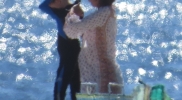
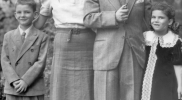
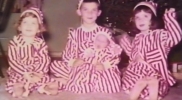
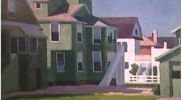
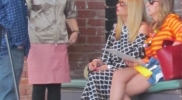


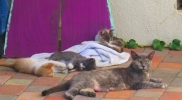

![[000015] [000015]](https://beforetheblog.com/wp-content/gallery/kids/thumbs/thumbs_000015.jpg)
